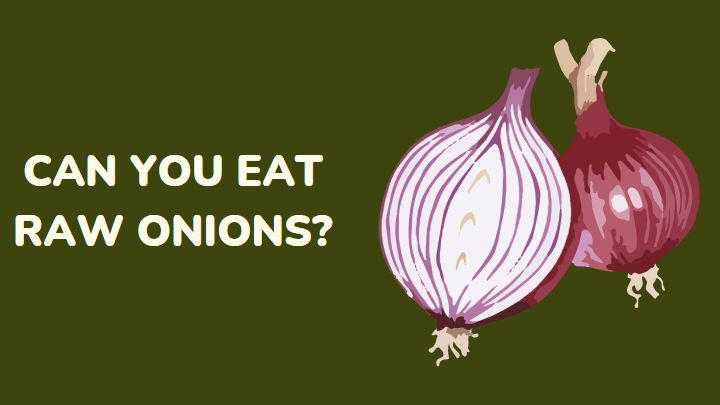Can you eat raw onions? Yes, you can. While some people find the pungent taste of raw onions refreshing, others would rather not have it. If you belong to the first group, you’re not doing anything unhealthy.
Your only concern about eating raw onions is your breath. Other than that, you’re not only eating something delicious, you’re getting a good dose of undiluted nutrients.
If you have never had raw onions, you can start by learning what it tastes like. Also, find out the benefits, the likely side effects, and how to eliminate the pungent smell from your breath.
Can you eat raw onions?
Yes, you can. Raw onions are healthy and safe to eat, but there are a few things to keep in mind when eating them.
First, raw onions may cause indigestion or heartburn in some people. If you usually experience this, reduce your portions or avoid eating them altogether.
One of the major concerns with eating raw onions is bad breath. This usually happens when you eat too many raw onions. But you can also clear this off by chewing on a piece of mint or parsley after eating onions.
Although it is quite rare, some people have onion allergies. When these people eat raw onions, they experience symptoms such as vomiting, swelling, itching, and difficulty in breathing.
Ultimately, if you choose to eat a raw onion, it is best to eat small quantities and watch out for your body’s reaction.
Are onions healthier raw or cooked?
Generally, raw onions are more nutritious and healthier. However, the answer to this question depends on what you are looking to get out of onions.
Onions are a source of many nutrients, whether raw or cooked, but some may be more bioavailable in one form or the other.
For example, cooking onions can make them easier to digest, but it may also reduce the content of certain vitamins and minerals.
Ultimately, the best way to incorporate onions into your diet is to find what fits your nutritional needs.
How much raw onions can you eat per day?
Generally, eating one medium-sized onion per day is safe. This is equal to about half a cup of chopped onion or one small onion.
However, if you’re eating other foods that contain onions (such as French onion soup), you may want to limit your intake to less than one onion per day.
Health benefits of eating raw onions
- Onions are a good source of fiber, which can help to regulate digestion and prevent constipation.
- They also contain a substance called allicin, which has antibacterial and antifungal properties. This can help to keep the gut healthy and free from infection.
- Onions are rich in antioxidants, which can help protect cells from damage and reduce the risk of some diseases such as cancer.
- They also contain vitamins and minerals, including vitamin C, folate, and potassium. These nutrients are important for maintaining good health.
- Including onions in the diet can help to lower blood pressure and cholesterol levels. This can reduce the risk of heart disease and stroke.
- Onions may also help to reduce the risk of some types of cancer, such as stomach and colon cancer. This is thought to be due to their high content of antioxidants and other substances that have anticancer effects.
- Onions can also help to boost the immune system, which can help to protect against infection and disease.
- They may also help to reduce inflammation, which can contribute to a range of conditions such as arthritis and asthma.
- Including onions in the diet can also help to promote bone health by increasing calcium absorption and reducing the risk of osteoporosis.
- Also, onions are a low-calorie food that can help with weight loss or weight maintenance. They can be used in place of higher-calorie ingredients, such as cream or cheese, in many recipes.
Side effects of eating raw onions
Raw onions are more likely to cause gas and bloating than cooked onions. They can also trigger heartburn and indigestion.
If you have sensitive bowels, you may want to avoid eating raw onions. Cooking onions can help reduce these potential side effects. Also, eating small amounts can be helpful.
FAQs
Can you eat raw onions in a salad?
Yes, you can eat raw onions in a salad. Just make sure to wash them first! Raw onions can add a lot of flavor to your salad but they are also pungent.
If you’re not a fan of intense flavors, boil the onions lightly before adding them to your salad.
Can you eat raw onions during pregnancy?
Yes, you can. Some pregnant women can eat raw onions without experiencing any problems, while others may feel nauseous after eating them.
If you’re pregnant, there’s no harm in eating cooked or raw onions. If it makes you nauseous, please, drop the onion.
Can you eat spring onions raw?
Yes, you can eat spring onions raw. They have a slightly sweet and sharp flavor that goes well in salads or as a garnish on other dishes. Spring onions are also a good source of vitamin C and other nutrients.
Can you eat green onions raw?
Yes, green onions are perfectly safe to eat raw. They are often used as a garnish or flavor enhancer in many dishes. Ensure you wash them thoroughly before eating to remove any dirt or bacteria.
Conclusion
There are a few risks associated with eating raw onions. Some of them are food poisoning, indigestion, and bad breath.
However, if you select fresh, high-quality onions and properly clean them before consumption, you can enjoy their flavor and health benefits without worry.
If you have any concerns about eating raw onions, cook them before eating or eat them in small amounts. Overall, raw onions are healthy and nutrient-rich.
Finally, if you love to buy onions in large quantities, here’s how to store them properly and identify the bad ones.
Thank you for reading.
